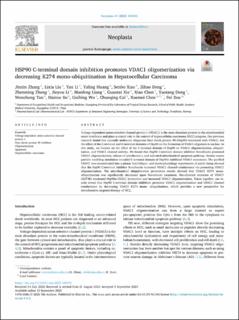| dc.contributor.author | Zhang, Jinxin | |
| dc.contributor.author | Liu, Lixia | |
| dc.contributor.author | Li, Yan | |
| dc.contributor.author | Huang, Yaling | |
| dc.contributor.author | Xiao, Senbo | |
| dc.contributor.author | Deng, Zihao | |
| dc.contributor.author | Zheng, Zhenming | |
| dc.contributor.author | Li, Jieyou | |
| dc.contributor.author | Liang, Manfeng | |
| dc.contributor.author | Xie, Guantai | |
| dc.contributor.author | Chen, Xiao | |
| dc.contributor.author | Deng, Yaotang | |
| dc.contributor.author | Tan, Wenchong | |
| dc.contributor.author | Su, Hairou | |
| dc.contributor.author | Wu, Guibing | |
| dc.contributor.author | Cai, Chunqing | |
| dc.contributor.author | Chen, Xuemei | |
| dc.contributor.author | Zou, Fei | |
| dc.date.accessioned | 2024-03-18T12:40:09Z | |
| dc.date.available | 2024-03-18T12:40:09Z | |
| dc.date.created | 2023-10-03T10:23:21Z | |
| dc.date.issued | 2023 | |
| dc.identifier.citation | Neoplasia. 2023, 44 . | en_US |
| dc.identifier.issn | 1522-8002 | |
| dc.identifier.uri | https://hdl.handle.net/11250/3122888 | |
| dc.description.abstract | Voltage-dependent anion-selective channel protein 1 (VDAC1) is the most abundant protein in the mitochondrial outer membrane and plays a crucial role in the control of hepatocellular carcinoma (HCC) progress. Our previous research found that cytosolic molecular chaperone heat shock protein 90 (Hsp90) interacted with VDAC1, but the effect of the C-terminal and N-terminal domains of Hsp90 on the formation of VDAC1 oligomers is unclear. In this study, we focused on the effect of the C-terminal domain of Hsp90 on VDAC1 oligomerization, ubiquitination, and VDAC1 channel activity. We found that Hsp90 C-terminal domain inhibitor Novobiocin promoted VDAC1 oligomerization, release of cytochrome c, and activated mitochondrial apoptosis pathway. Atomic coarse particle modeling simulation revealed C-terminal domain of Hsp90α stabilized VDAC1 monomers. The purified VDAC1 was reconstituted into a planar lipid bilayer, and electrophysiology experiments of patch clamp showed that the Hsp90 C-terminal inhibitor Novobiocin increased VDAC1 channel conductance via promoting VDAC1 oligomerization. The mitochondrial ubiquitination proteomics results showed that VDAC1 K274 mono-ubiquitination was significantly decreased upon Novobiocin treatment. Site-directed mutation of VDAC1 (K274R) weakened Hsp90α-VDAC1 interaction and increased VDAC1 oligomerization. Taken together, our results reveal that Hsp90 C-terminal domain inhibition promotes VDAC1 oligomerization and VDAC1 channel conductance by decreasing VDAC1 K274 mono- ubiquitination, which provides a new perspective for mitochondria-targeted therapy of HCC. | en_US |
| dc.language.iso | eng | en_US |
| dc.publisher | Elsevier | en_US |
| dc.rights | Attribution-NonCommercial-NoDerivatives 4.0 Internasjonal | * |
| dc.rights.uri | http://creativecommons.org/licenses/by-nc-nd/4.0/deed.no | * |
| dc.title | HSP90 C-terminal domain inhibition promotes VDAC1 oligomerization via decreasing K274 mono-ubiquitination in Hepatocellular Carcinoma | en_US |
| dc.title.alternative | HSP90 C-terminal domain inhibition promotes VDAC1 oligomerization via decreasing K274 mono-ubiquitination in Hepatocellular Carcinoma | en_US |
| dc.type | Peer reviewed | en_US |
| dc.type | Journal article | en_US |
| dc.description.version | publishedVersion | en_US |
| dc.source.pagenumber | 0 | en_US |
| dc.source.volume | 44 | en_US |
| dc.source.journal | Neoplasia | en_US |
| dc.identifier.doi | 10.1016/j.neo.2023.100935 | |
| dc.identifier.cristin | 2181214 | |
| cristin.ispublished | true | |
| cristin.fulltext | original | |
| cristin.qualitycode | 1 | |

